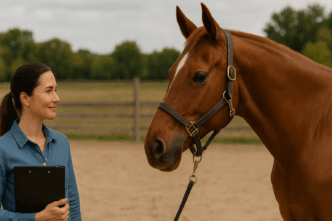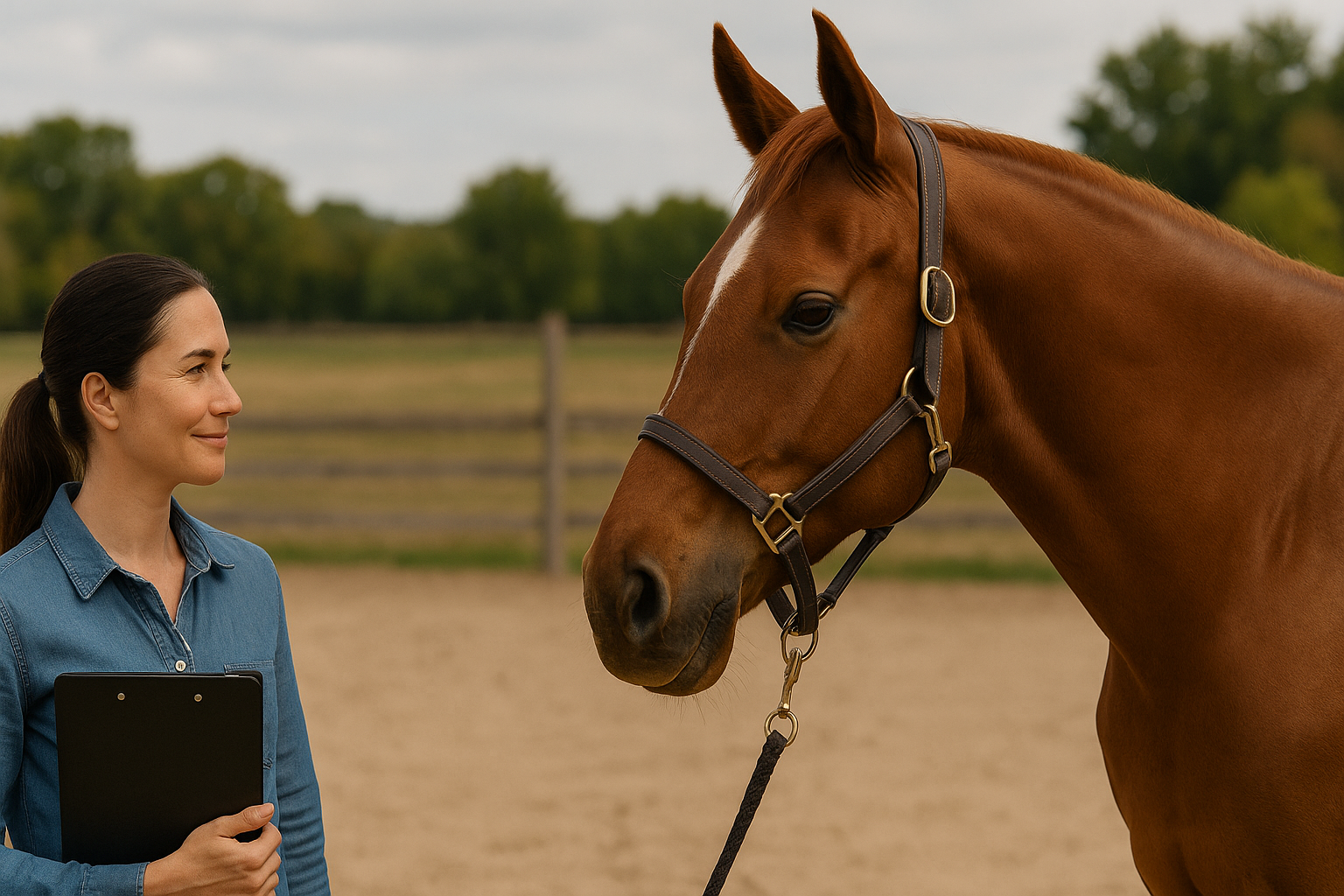Equine-assisted services are becoming one of the most trusted complementary approaches in mental health, education, rehabilitation, and personal development. As demand increases, the need for qualified, certified equine therapy practitioners continues to grow. Certification is no longer optional for professionals who want to provide safe, ethical, and effective equine-assisted sessions. It is a marker of credibility, competence, and a commitment to client and horse welfare.
This guide explains what equine therapy certification involves, the most recognized certification programs, training requirements, costs, and how to choose the right certification path based on your professional background.
What Is Equine Therapy Certification?
Equine therapy certification is a structured training and evaluation process that qualifies practitioners to integrate horses into therapeutic, educational, or wellness settings. Certification verifies that a practitioner understands equine behavior, risk management, client safety, professional ethics, session facilitation, and the principles behind equine-assisted interventions.
In the equine-assisted field, certification ensures consistency and protects clients by confirming that providers follow recognized standards rather than relying on personal intuition or informal experience. Because horses are sensitive, prey-driven animals, proper training is essential for maintaining physical and emotional safety.
Why Equine Therapy Certification Matters
Certification plays a crucial role in three key areas: safety, professionalism, and credibility. Horses communicate through subtle cues, and misreading those signals can create unsafe interactions. Certified practitioners learn how to select appropriate horses, monitor stress responses, and maintain a controlled environment that supports both client progress and equine welfare.
Certification also elevates the professionalism of equine-assisted services. Mental-health clinics, riding centers, insurance partners, and referral networks increasingly seek practitioners with accredited training. As the field becomes more regulated, certification helps practitioners remain competitive, build trust with clients, and meet the expectations of partnering organizations.
Types of Equine Therapy Certification
Although “equine therapy” is used as a catch-all phrase, there are several distinct certification paths. Each aligns with different goals, populations, and professional backgrounds.
Equine-Assisted Psychotherapy (EAP)
Designed for licensed mental-health professionals, EAP certification teaches clinicians how to incorporate horses into treatment for trauma, anxiety, depression, relational challenges, and emotional regulation. Organizations such as Eagala, Natural Lifemanship, and PATH Intl. offer respected clinical tracks. These programs emphasize ethical practice, therapeutic boundaries, emotional safety, and the relational dynamics between humans and horses.
Equine-Assisted Learning (EAL)
EAL certification focuses on experiential learning rather than clinical treatment. It is commonly used in leadership training, youth development, communication skills, team-building, and social-emotional learning programs. Educators, coaches, and facilitators often choose this path because it does not require a mental-health license. Training organizations like E3A and EAHAE offer structured curriculum models for learning-based sessions.
Hippotherapy Certification
Hippotherapy is a clinical approach used by licensed physical therapists, occupational therapists, and speech-language pathologists. Certification through the American Hippotherapy Certification Board teaches providers how to use the horse’s movement as part of a structured rehabilitation plan. This pathway requires an existing healthcare license and emphasizes treatment planning, biomechanics, and therapeutic integration.
PATH Intl. Instructor and Specialist Certifications
PATH Intl. offers internationally recognized certifications for adaptive riding instructors and equine specialists. These tracks are ideal for equine professionals, riding instructors, or program directors who work with individuals with disabilities. Training includes safety protocols, program structure, equine management, and mounted or unmounted instruction.
Trauma-Informed and Relational Equine Certifications
Some modern certification programs specialize in trauma-responsive equine work. These pathways blend attachment science, neuroscience, somatic awareness, and ethical horsemanship. They are popular with clinicians, coaches, and equine specialists who work with trauma survivors, veterans, first responders, or vulnerable youth.
What You Learn During Equine Therapy Certification
Certification programs combine equine science, human development, and facilitation skills. Practitioners learn how to read equine body language, respond to stress signals, and choose horses that are emotionally suitable for client work. They also learn how to plan sessions, manage risk, and support clients through emotional or behavioral challenges.
Most programs emphasize a trauma-informed approach. This includes understanding the nervous system, maintaining emotional safety, and recognizing when clients need additional support from licensed professionals. Ethics, boundaries, documentation, and confidentiality are also core components of certification.
Training Requirements and How Long Certification Takes
Training requirements vary across programs, but most certifications include a combination of online modules, in-person intensives, mentorship, and supervised practice hours. Some programs can be completed in a long weekend, while others require several months of training and evaluations. Many certifications also require continuing education to stay current with best practices.
Prior equine experience is helpful but not always required; some programs teach foundational horsemanship, while others expect practitioners to arrive with established skills.
Cost of Equine Therapy Certification
The cost of certification depends on the type of program and the level of instruction provided. Equine-assisted psychotherapy certifications typically range from $1,200 to $6,000. Equine-assisted learning certifications are often between $850 and $3,500. PATH Intl. instructor training generally falls between $1,000 and $3,000, while hippotherapy certification may cost $2,000 to $5,000 due to clinical coursework and examination fees.
Additional expenses may include travel, accommodations for in-person training, facility insurance, continuing education, and membership fees. Many practitioners view certification as a long-term investment that increases earning potential and program credibility.
Career Opportunities for Certified Practitioners
Certification opens doors across a wide range of environments. Many professionals work at therapeutic riding centers, mental-health agencies, or private equine-assisted facilities. Others integrate equine-assisted services into counseling practices, school-based programs, rehabilitation centers, or youth organizations.
Equine-assisted learning providers often collaborate with corporate teams, leadership programs, and personal-development retreats. Trauma-focused practitioners may work with veterans, first responders, or survivors of complex trauma. Because the field is expanding, certified professionals are positioned for growth in both traditional and alternative wellness settings.
How to Choose the Right Equine Therapy Certification
Selecting a certification begins with your professional background and the populations you intend to serve. Licensed clinicians should choose clinical equine-assisted psychotherapy programs. Educators, coaches, and facilitators may prefer equine-assisted learning models. Rehabilitation professionals will follow the hippotherapy pathway, and equine specialists often choose PATH Intl. or trauma-informed horsemanship programs.
When comparing programs, look for clear ethical guidelines, strong equine-welfare practices, evidence-informed curriculum, and supportive mentorship. The best certifications provide meaningful hands-on experience and a professional community you can rely on long after training ends.
Is Equine Therapy Certification Worth It?
For most professionals, certification is a significant advantage. It enhances safety, strengthens professional credibility, and deepens expertise in equine-assisted work. It also builds trust with clients, families, and referral partners. As equine-assisted services continue to gain recognition, certification ensures that the work is grounded, ethical, and beneficial for both the client and the horse.
Becoming a certified equine therapy practitioner is not just a career decision—it is a commitment to offering high-quality, compassionate, and evidence-informed care in partnership with one of the most powerful therapeutic partners: the horse.














